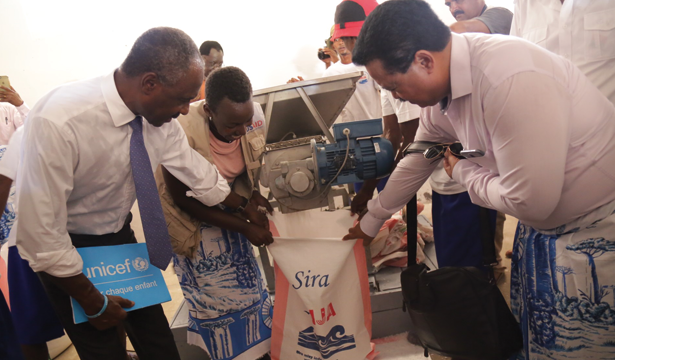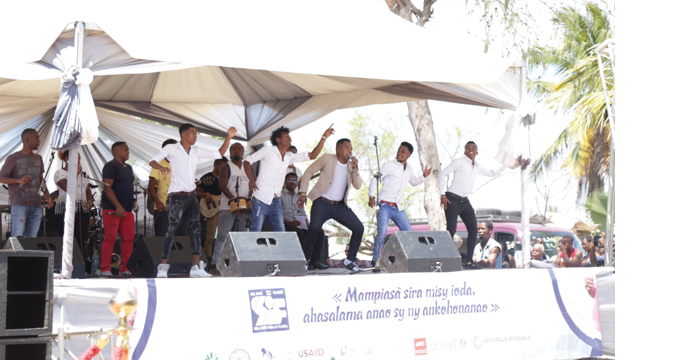Iodine Global Network (IGN)
Sprunglinks/Accesskeys
Zur Startseite (Accesskey 0) Direkt zur Hauptnavigation (Accesskey 1) Direkt zum Inhalt (Accesskey 2) Kontakt (Accesskey 3) Sitemap (Accesskey 4) Suche (Accesskey 5)
DONATE

A new partnership with Japan boosts iodine nutrition in Madagascar
May, 2019
by Marie-Claude Désilets, Minoru Irie, Festo Kavishe and Isiye Ndombi
by Marie-Claude Désilets, Minoru Irie, Festo Kavishe and Isiye Ndombi
Through strategic partnership, we can protect newborns from Madagascar from preventable brain damage due to iodine deficiency.
In Morondava, Madagascar, on February 14th 2019, stakeholders and members of the public gathered to the live soundtrack of the local Leahaly band to celebrate a shipment that will prevent brain damage in thousands of babies in the country this year and beyond.
In the delivered shipment was potassium iodate, 850 kg of it – enough to provide adequately iodized salt to around 80% of the national population, beginning this year.

Making the first batch of iodized salt in Morondava thanks to a donation of potassium iodate.
Iodine nutrition has been a serious public health problem in Madagascar, with political will inconsistent over the past decades, and levels alarmingly low according to the last national survey in 2016, leaving babies at risk of being born with mental impairment.
Now, Madagascar is seeing a sea change – a renewed commitment toward salt iodization. The intervention, a simple and proven solution to iodine malnutrition, was named a key action of the national nutrition plan through 2021. Among the changes to take place is an increased capacity for regulatory monitoring and enforcement, two keystones of successful salt iodization programs.
For Madagascar’s salt producers, this is good news. As part of the deal, they’ll receive iodization and quality control equipment. It will also be used to help establish a revolving fund so that the fortificant, potassium iodate, can ultimately be provided sustainably.
In the meantime, the interim progress is the result of a new partnership between our organizations and other key partners, including: The Japanese Foundation for Growth Science & Japan Iodine Industries Association (JIIA), Chiba Prefecture, the Madagascar national Government, regional government of Morondava, UNICEF, USAID, IGN, and salt producers. It truly takes a village to get these programs off the ground, and we have been delighted to witness the progress.

Attending the official donation ceremony in Chiba Prefecture, Japan are (left to right) Mr. Y. Tachi, Mr. T. Fujino, Dr. M. Irie, Ms. M. Rakotomalala, Mr. S. Takigawa, and Mr. T. Mori.
In the Chiba Prefecture, the partnership kicked off on the last Monday of October 2018 with a donation ceremony. Since then we successfully came together to broker our respective resources and areas of expertise to the task of addressing iodine deficiency in Madagascar.
We even collaborated on the lyrics to a song that the Leahaly wrote for the occasion. Listen to the song, in Malagasy, here.
One verse of the song goes like this:
| Malagasy | English |
| Tadidio ry vehivavy bevohoka, | Remember, pregnant women, |
| Mampivelatra ny sain’ny zaza ao am-bohoka, | Developing baby's mind in the womb, |
| Misoroka ny fahafahan-jaza, ho anao koa, | Preventing spontaneous abortion, |
| Ny fihinana sira misy ioda isan’andro | for you, the daily use of iodized salt |

The Leahaly band performing live at the event in Morondava.
As we celebrate this initial success, we’re already looking ahead to what it will take to strengthen and sustain this critical national nutrition intervention. Together we’ll be working towards:
|
While it’s a well-recognized challenge of international, public-private partnership to engage such diverse stakeholders, the results, in this case, could mean life-changing health impacts for an entire country. We pledge to continue to work together to protect newborns in Madagascar from preventable mental impairment, and ensure the next generation can thrive.
Read more about our work in Madagascar in the February 2019 article of the IDD Newsletter.
Read more about the new partnership in the news:
![]()
About the authors
Marie-Claude Désilets has been head of nutrition at UNICEF in Madagascar since March 2018. She has been working for 9 years with UNICEF in different countries: nutrition specialist in Haiti, head of nutrition in North Korea, head of Nutrition, then Head of Health and Nutrition in Burundi. Marie-Claude worked as a nutrition consultant for UNICEF in Namibia, with various NGOs in the Democratic Republic of Congo, as a nutritionist at a community health center in Canada and as a coordinator of research project at the University of Montreal (Canada) where she obtained a doctorate in nutrition.


Dr. Isiye Ndombi is an MD from the University of Nairobi (Kenya), an MMed in Public and Child Health from University of Nairobi and an MBA from University of Newcastle (Australia). He was formerly a s Lecturer in Child Health at the University of Nairobi, UNICEF Deputy Regional Director in East Asia and Pacific and is currently an IGN Consultant for Eastern and Southern Africa.